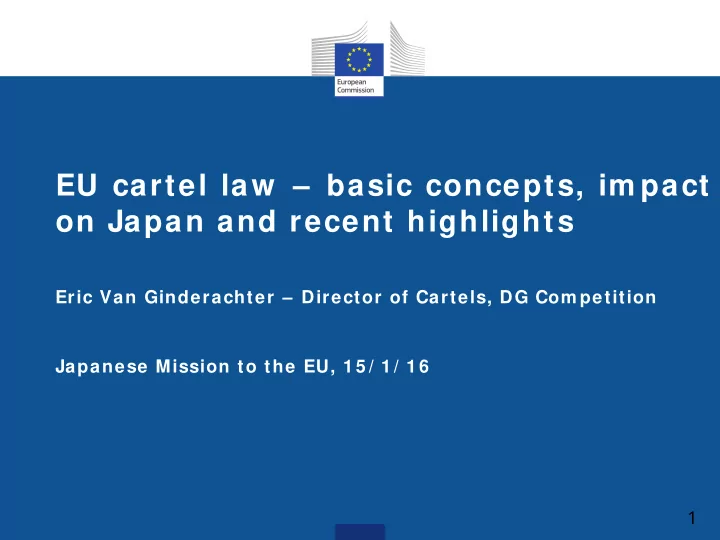

EU cartel law – basic concepts, im pact on Japan and recent highlights Eric Van Ginderachter – Director of Cartels, DG Com petition Japanese Mission to the EU, 1 5 / 1 / 1 6 1
Outline 1 . Basics of EU cartel policy 1 . EU cartel policy and Japan 2 . Som e highlights of 2 0 1 5 2
Cartel enforcem ent is a priority " Fighting cartels is a very high priority for the European Commission. This is because of the serious harm cartels cause to consumers and businesses. And the huge damage cartels inflict on the economy as a whole in terms of removing incentives to compete on prices or to innovate." Com m issioner Vestager, 2 4 June 2 0 1 5 • This priority is in line with President Juncker's new Commission priorities on jobs, growth and investment. • Consumers must have free choice and access to the most innovative products at fair prices 3
Basics of enforcem ent policy - 1 • We are entrusted to enforce the rules only when compliance fails • No "targeting" • Investigation of all cases for which there is sufficient evidence – regardless of economic sector and size of markets involved • Investigation of all parties for which there is sufficient evidence (no "targeting"), regardless of size and degree of involvement in the cartel • • Investigation of the whole duration of continuous infringement • Fines • Calculated on the basis of gravity, duration and individual circumstances • Maximum amount of 10% of total turnover 4
Basics of enforcem ent policy - 2 • Tw o level system • EU level enforced by Commission (cartels covering 3 or more MS) • MS level enforced by 28 MSs • Our investigations • Leniency program since 1996 – last reviewed in 2006 • Ex officio cases (informants, NCAs, market monitoring) • Collecting evidence through dawn raids and information requests • Statement of objections, right to be heard, judicial review • Settlement procedure: 10% discount for acknowledging liability, on top of leniency reduction 5
I m portance of EU – Japan relations Japan is the EU's 7 th largest trading partner: 3% of total EU trade in goods 2003 EU-Japan bilateral cooperation agreement on competition: policy dialogues, effective case cooperation, bilateral meetings EU-Japan FTA negotiations: In July 2015, negotiators discussed a comprehensive Competition Chapter 6
Strong cooperation w ith Japan FTC • Good co-operation on co-ordination of inspections and requests for information – for example Car Parts • Efficient communications between authorities thanks to (i) exchanges of JFTC staff at Cartel directorate (ii) JFTC single contact point for immunity/ leniency coordination on all international investigations. • Discussions of cartel enforcement policy issues at international fora, such as the International Competition Network (ICN) . Cartel cooperation with Japan is 19% of our total cooperation with other authorities 7
Som e statistics • First cartel decision adopted in 1969 ( Quinine ) • First Japanese company fined in Stainless Steel Tubes (1999) • Since 2010, immunity to Japanese companies in Smartcard Chips, Bearings and Wire harnesses. 2 0 1 0 - 2 0 1 5 Total Japanese % Fines € 9.295 bn € 1.215 bn 13% Undertakings 215 32 14.8% Fines (S) € 4.287 bn € 493 m 11.4% Undertakings (S) 81 14 17.2% In 2010 – 2015, 35 cartel decisions were adopted, including 19 settlements 8
Recent and ongoing cases • Electrolytic capacitors – Statement of Objections sent in November 2015 • Optical Disk Drives – ordinary fines decision adopted in October 2015 • Power Cables – ordinary fines decision adopted in April 2014 9
2 0 1 5 Highlights I – LCDs and CRTs • Jurisdiction: "Implementation" – sales into the EU ( Woodpulp ) • For fines calculation (value of sales) this covers: • 1) Direct sales into the EU of the cartelised product , and • 2) Direct sales through transformed products – cartel in an intermediate product that cartelists incorporate into a final product that they sell in the EU: Confirmed in Innolux 10
2 0 1 5 Highlights I I - Settlem ents • System is mature and works well – efficiency savings, shorter decision and 10% fine discount • Acknowledgement of infringement is key point • Court has confirmed in Timab the legality of hybrid cases where not everyone wishes to settle • One tool in the toolbox – depends on circumstances (number of parties, degree of contestation, novel issues, aggravating circumstances) 11
• Thank you! • Questions 12
Recommend
More recommend